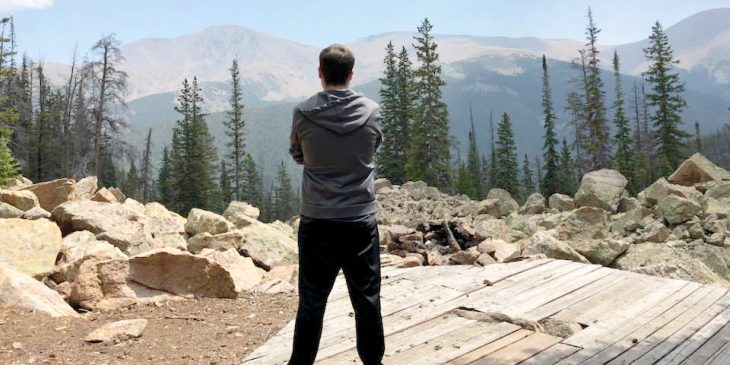In 2006, Jason Hallmark, a benefits enrollment specialist in the Insurance Services Division at UPMC, viewed “An Inconvenient Truth,” the documentary film featuring former U.S. Vice President Al Gore’s campaign to educate people about global warming.
“It was then I started down this rabbit hole [about climate change],” Hallmark said.
Over time, his devotion and sense of responsibility to the planet intensified. He wondered how future generations would react knowing those before them knew about climate change and sustainable resources and did nothing.
“I don’t want, 50 years from now, someone’s kids saying, ‘You knew this was happening. Why didn’t you do anything about it?’” Hallmark said.
An avid podcast listener, Hallmark frequently listened to “Global GoalsCast,” which is where he first heard about Robert Swan, OBE, the first person to walk both the North and South Poles, and founder of 2041, an organization dedicated to the preservation of Antarctica. With a degree in sustainable management (and another in business management), Hallmark always had an interest in traveling to the Poles, and learning about Swan’s mission sent him over the edge.
An Unexpected Diagnosis

As Hallmark fought to change the world around him by studying up on climate change, he didn’t realize he was about to face his own, much more personal fight against change.
In 2016, Hallmark noticed numbness in his extremities. While he was concerned, he had been unexpectedly laid off by a previous employer and decided to wait to see a physician. His symptoms eventually subsided. Two years later, he accepted a full-time position at UPMC and immediately joined the Sustainability Committee at U.S. Steel Tower, which deals with issues ranging from recycling rules to energy improvements in the building.
By April 2018, however, his numbness returned along with headaches and vertigo, and he decided to check in at U.S. Steel Tower’s MyHealth@Work.
“When Jason first came in, I was concerned for the symptoms he was presenting,” said Tina DiNino, CRNP, a MyHealth@Work provider. “I was able to help him facilitate and establish care with a UPMC neurologist.”
As a relatively new employee, Hallmark took his time making the appointment.
“I actually waited one more day to make sure my insurance was active,” he said.
He went to the neurologist, who suspected a larger issue and ordered an MRI. His initial blood test results? Normal.
Hallmark unexpectedly had an allergic reaction to the MRI dye and returned to MyHealth@Work the following day. This time, DiNino sent him to UPMC Mercy emergency department, and the results were in: he had multiple sclerosis (MS), a disease of the central nervous system that disrupts the flow of information within the brain, and between the brain and body.
An Unwavering Passion
Hallmark grew up with a passion for science and the outdoors. As a child, he spent his free time fishing, kayaking and hiking, but the MS diagnosis would change everything. It meant big adjustments to his life, job and need for medical care. However, he was determined it wouldn’t slow down his fight to positively influence climate change.
While listening to another episode of “Global GoalsCast” called “Green Ministries,” Jason heard about the Leadership on the Edge program. He also learned that in 2041, the international treaty with Antarctica expires. Right now, no one can develop there. The program has been taking young leaders to the polar opposite — on Arctic adventures to inspire others to help address climate change — just like Hallmark had been doing a little bit at a time, by showing them first-hand some of the changes that have been occurring at the Poles with the warm-up of the climate.
Three days after his diagnosis, Hallmark applied. A few days later received an email with instructions on step two — the interview process.
“I didn’t think I had a chance — a kid that grew up in Pittsburgh, going to city schools my whole life,” Hallmark said. “I never thought anything like this would ever be possible for me.”
Three weeks later, he was notified of his status. Accepted.
The Trip of a Lifetime
 Last Saturday, Hallmark embarked on a 12-day journey with about 90 people from 25 countries to the Arctic, where he will be encouraged to “contemplate preserving the biosphere and the delicacy of this ecosystem.”
Last Saturday, Hallmark embarked on a 12-day journey with about 90 people from 25 countries to the Arctic, where he will be encouraged to “contemplate preserving the biosphere and the delicacy of this ecosystem.”
“I want to learn the necessary skills to be able to become a change leader and inspire others in the Pittsburgh area to promote sustainability and environmental stewardship,” Hallmark said.
The trip will include everything from observing massive icebergs and glaciers, to witnessing polar bears on ice sheets, to leaping into sub-freezing waters during the Polar Plunge — the latter of which is of most concern. After being diagnosed just over a year ago, Hallmark is learning the limitations of his body. For Hallmark, temperature intolerances are very real. He can’t go out in the summer without instantly becoming numb. He can’t take hot showers. The cold is just as critical. In winter temperatures, his legs get numb and his muscles get tight and heavy, making it difficult to walk.
While he may accept the limitations of MS, he is not willing to put aside his goals.
“I need to talk to my neurologist about the Polar Plunge,” Hallmark said. “It’s one of the things that they all do on the ship in the middle of the trip, but I’m going to ask them if they can do it on the last day.”
To treat his MS, Hallmark is undergoing infusion therapy, in which his medication is supplied intravenously every six months, at UPMC Magee-Womens Hospital.
“I don’t know how I’d be without the treatment of UPMC and my coworkers are so excited for my trip,” he said. “I may have MS, but there’s no way it’s going to stop me.”









